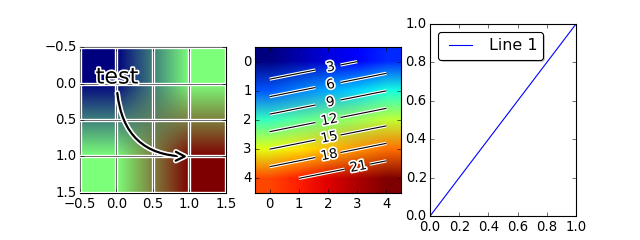

(Source code, png)

import matplotlib.pyplot as plt
import matplotlib.patheffects as PathEffects
import numpy as np
if 1:
plt.figure(1, figsize=(8, 3))
ax1 = plt.subplot(131)
ax1.imshow([[1, 2], [2, 3]])
txt = ax1.annotate("test", (1., 1.), (0., 0),
arrowprops=dict(arrowstyle="->",
connectionstyle="angle3", lw=2),
size=20, ha="center", path_effects=[PathEffects.withStroke(linewidth=3,
foreground="w")])
txt.arrow_patch.set_path_effects([
PathEffects.Stroke(linewidth=5, foreground="w"),
PathEffects.Normal()])
ax1.grid(True, linestyle="-")
pe = [PathEffects.withStroke(linewidth=3,
foreground="w")]
for l in ax1.get_xgridlines() + ax1.get_ygridlines():
l.set_path_effects(pe)
ax2 = plt.subplot(132)
arr = np.arange(25).reshape((5, 5))
ax2.imshow(arr)
cntr = ax2.contour(arr, colors="k")
plt.setp(cntr.collections, path_effects=[
PathEffects.withStroke(linewidth=3, foreground="w")])
clbls = ax2.clabel(cntr, fmt="%2.0f", use_clabeltext=True)
plt.setp(clbls, path_effects=[
PathEffects.withStroke(linewidth=3, foreground="w")])
# shadow as a path effect
ax3 = plt.subplot(133)
p1, = ax3.plot([0, 1], [0, 1])
leg = ax3.legend([p1], ["Line 1"], fancybox=True, loc=2)
leg.legendPatch.set_path_effects([PathEffects.withSimplePatchShadow()])
plt.show()
Keywords: python, matplotlib, pylab, example, codex (see Search examples)